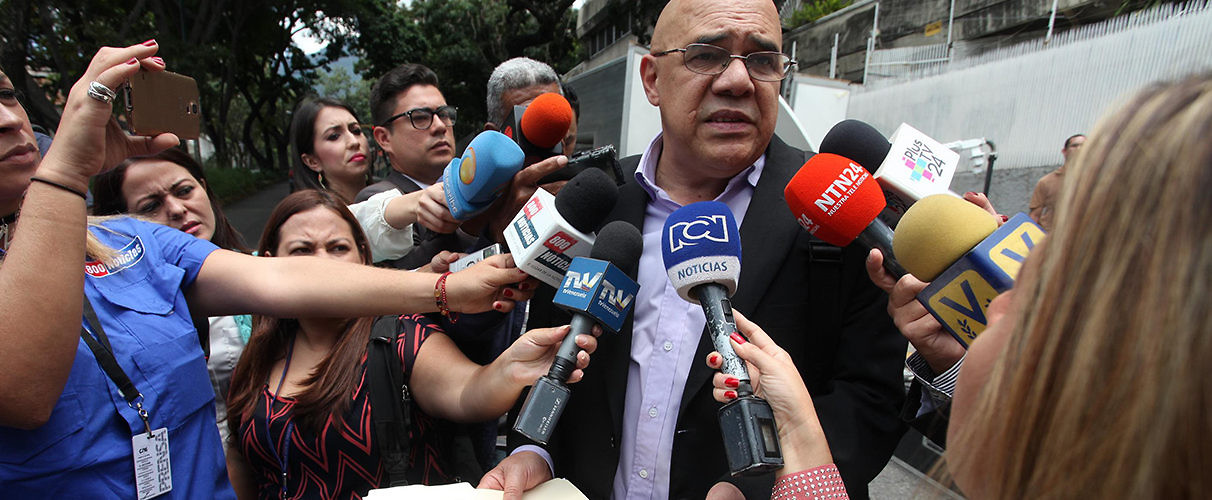Executive Secretary of Venezuela's MUD opposition coalition, Jesus Torrealba, displays signatures calling for a recall referendum against President Nicolás Maduro. Caracas, Venezuela, September 28, 2016 (Raul Romero, El Nacional)
After a second meeting between Venezuela’s political rivals earlier this month, the opposition is still debating the merits of engaging in the Vatican-backed dialogue to end the country’s political crisis. In October, the government-controlled electoral council blocked a recall referendum against President Nicolás Maduro. This was one of the last constitutional mechanisms available for regime change—the opposition could call for a constitutional assembly, but the procedure is similar to that of the recall referendum and, given the ongoing public support for former President Hugo Chávez’s constitution, less likely to succeed.
The decision to block the referendum was a blow to what had been fairly successful opposition efforts to trigger a democratic transition. This has not been an easy task considering Venezuela has had an increasingly more authoritarian regime for the past several years. The executive has full control over courts and oversight agencies—until January this year it also controlled Congress—and uses this to harass opposition members, curtail their access to resources, manipulate the electoral law, and circumvent the authority of popularly elected officers that oppose it.
Building on effective but ultimately unsuccessful electoral campaigns in 2007, 2010, and 2012, and visible but still failed protests in 2014, the opposition Democratic Unity Roundtable (MUD) has recently been opposing the government through both elections and street mobilizations. Leveraging protests and strikes, it forced Chávez to schedule parliamentary elections in 2015 and, using creative techniques to level the playing field, won two thirds of the seats. Employing these same strategies, the MUD also pushed forward the recall referendum process. Despite the electoral authority’s invented requirements and unjustified delays, the opposition forced along the process and collected and validated the signatures required to ask for the referendum. Had it not be interrupted, the plebiscite would have likely taken place in 2017. Though insufficient to trigger immediate presidential elections, this would have at least strengthened the MUD.
The suspension of the process forced the opposition to look for alternatives. The situation in Venezuela is pressing. The country suffers from world-record high inflation, scarcity, and one of the region’s highest homicide rates, yet the government has refused to address the situation. Doing so would require disassembling Chávez’s economic model, which could hurt the little support the executive has left. The referendum was not only a mechanism aimed at triggering a transition to democracy, but also to implement policies for addressing this urgent situation. Without it, the opposition has few options left.
On the one hand, the MUD could organize demonstrations demanding the government reinstate the referendum or call for early presidential elections. Even though these gatherings are likely to be massive, without the opposition gaining the favor of the armed forces, the Chavistas have no need to respond to them. The military has been one of the largest beneficiaries of the regime and unless it is divided—which is improbable, but possible—it is doubtful members will support the opposition. If anything, large-scale protests, especially if they turn violent, might trigger an internal coup against Maduro, the outcome of which is hard to predict.
On the other hand, the opposition could attempt to convince the government to allow the referendum or early elections in exchange for something. Dialogue remains an effective strategy to transition to democracy and at least some inside the government seem interested in negotiating.
The MUD is now divided between these two alternatives. Where some of its leaders support the negotiations and have participated in the process arranged by former presidents, the Vatican, and the Union of South American Nations (UNASUR), others argue the meetings are pointless, and favor more street demonstrations. Government-opposition dialogue in Venezuela faces several challenges in this regard:
- First, it raises the specter of the 2004 OAS-Carter Center negotiating table, which many feel allowed the government to buy time and stifled the opposition’s momentum
- Second, even if they are serious about stepping down, what Chavistas ask for in return may prove difficult to realize. Some, particularly in the military, have been involved in human rights abuses, corruption, and drug trafficking. It is unlikely they will give up power unless the opposition promises to protect their liberty, assets, and even some form of access to state power. Moderate sectors inside the opposition might be willing to make concessions, but more radical ones—whose members have been largely the victims of the government’s abuses—will be less so
- Third, Chavistas themselves seem to be divided about the negotiations. Some have given signs they are ready to negotiate, but others have thwarted preliminary agreements, which suggests they disagree with the dialogue. Negotiating with the government will lead nowhere if half the Chavistas —the military foremost—refuse to abide by whatever is agreed.
In that scenario, neither popular mobilizations nor dialogue will be fruitful in isolation. Some have rightly suggested that the MUD needs to use both. Negotiating a peaceful transition to democracy is, however, a long game that requires a careful balance between maintaining pressure and making necessary concessions. The opposition should use the streets enough to push Chavistas to negotiate and honor the agreements, but not too much that they will fear for their future and cling to the regime even more. Similarly, the MUD should ask for important concessions from the government, including the holding of the referendum, release of political prisoners, and establishment of neutral courts and oversight agencies. But in doing so they must recognize that some of these concessions will take time, and even if supposedly guaranteed by the constitution, might involve giving up something in return.
Laura Gamboa-Gutiérrez is Assistant Professor in the Department of Political Science at Utah State University.





